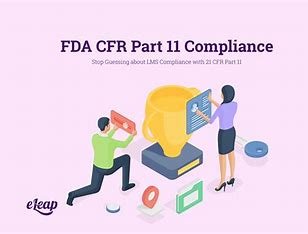Learn about the severe consequences of failing to comply with FDA Part 11 regulations on electronic records and signatures. Discover how to safeguard your organization against penalties, recalls, and more.
Part 11, Electronic Records; Electronic Signatures: The US Food and Drug Administration’s (FDA) Part 11 regulations are not to be trifled with for those in the pharmaceutical, biotechnology, and medical device industry. Compliance with Part 11 ensures that their products are safe and effective to use. Failure to comply with these legal requirements can have significant ramifications with respect to fines, product recalls and, in some cases, criminal charges.
Part 11 is designed to guarantee better traceability, consistency and validity of electronic records as applied within FDA-regulated industries. FDA requires that records and signatures in electronic format be equivalent to paper-based records and handwritten signatures executed on paper (21 CFR Part 11), which establishes that the provisions of this rule apply to all FDA-regulated activities using electronic systems for creating, modifying, maintaining, archiving, retrieving or transmitting any information required under any federal drug program such as submissions to the FDA.
The repercussions of failing to be compliant with Part 11 can be severe. Companies that do not have safeguards in place to protect the electronic records and signatures from being accessed, modified or deleted can face fines and penalties. This can drain company’s financial resources and tarnish the company image.
Products could also be subject to recall in the event of non-compliance. If the FDA determines that a company’s electronic records or signatures are not trustworthy, reliable and/or equivalent to paper records made in conformance with part 11, this may be used as evidence for a product recall. This can lead to the business losing money and also its reputation. Product recall can also cause the company to be sued and even face criminal charges in some instances.
Moreover, if Part 11 is not followed as it pertains to these studies, submission of the results in New Drug Applications (NDAs), Biologics License Applications (BLAs), or Investigational New Drug Applications (INDs) for FDA reviews and approvals may be rejected. This can lead to delays in getting new products approved which can stop those products from coming to the market.
Companies must put in place procedures, policies, and security mechanisms that would enable them to trust their electronic records and signatures while meeting the conditions of Part 11 to avoid these consequences. The system will include security measures, including: Limiting System Access to Authorized Individuals; Entity Authentication (Supplement), Electronic Assertions of Fiduciary Responsibility. Non-Repudiation (SOP) for elements outlined in the SOP prevent unauthorized access to the data at both Writing Stations, and Transactional Stations ensuring traceability of the users and work steps that create an electronic record.
Account Lockout- and Access Control should be implemented to permitted users and limit changes. Only authorized individuals are allowed to have password or smart card credentials. Deleting an account occurs only if all employee who provides services on a computing system signs in minutes or days while appropriate deletion controls are documented.
Conclusion
To sum it up, failing to meet Part 11 (Electronic Records; Electronic Signatures) can have dire consequences. Companies in industries that are subject to regulations by the FDA need to take heed of these regulations and should put in place necessary guidelines, policies, and safeguards to ensure their electronic records with accompanying signatures is trustworthy, reliable, and secure. Failure to adhere to these regulations can carry fines, product recalls and in some instances become the substance of criminal charges which could be extremely damaging for companies and their investors alike.
Get in touch with BioBoston Consulting or learn more at our website to see how we can help your organization.


